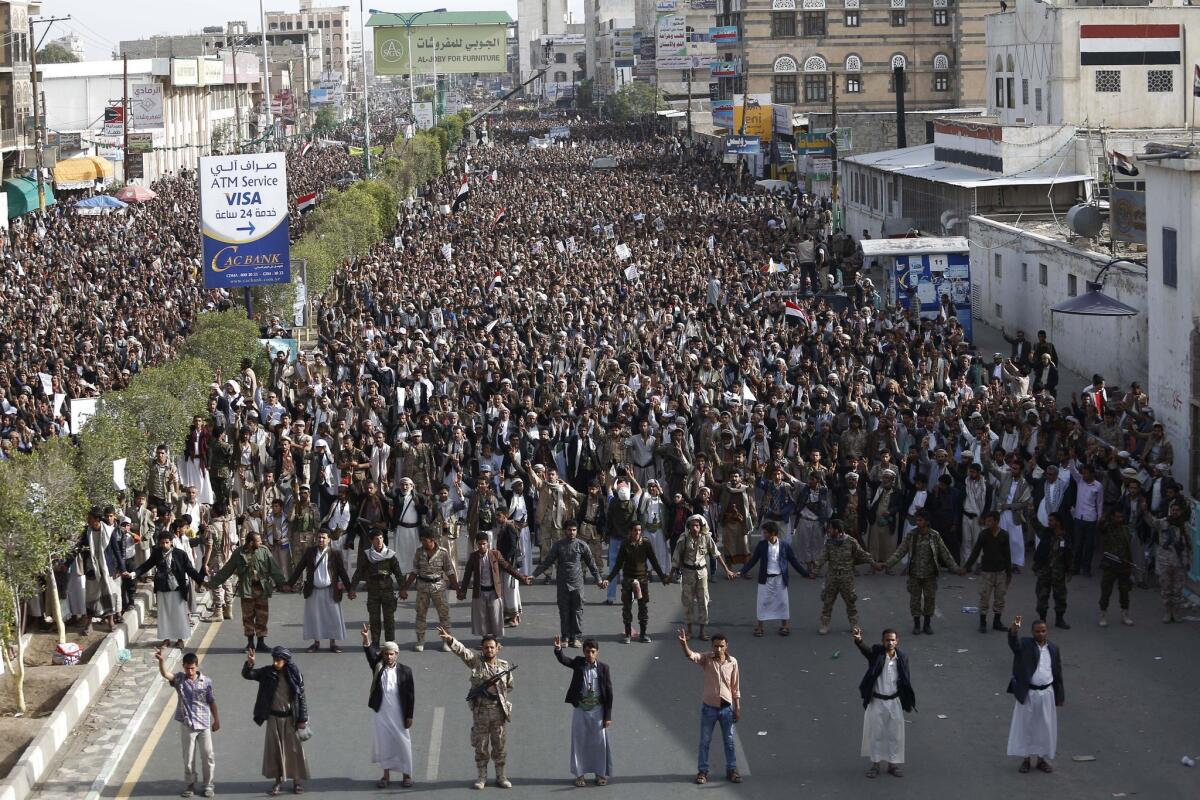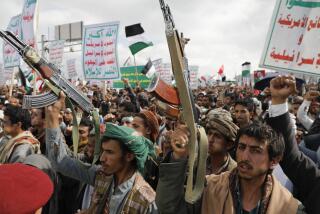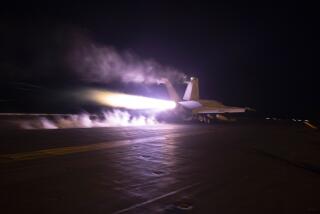War of words -- and bombs -- shakes Yemen

Shiite rebels known as Houthis hold a rally to denounce the Saudi-led airstrikes during a protest in Sana, Yemen, on Monday.
With Saudi Arabia beefing up its forces along the frontier with Yemen, rival Iran on Monday unleashed some of its harshest rhetoric yet in denouncing the month-old Saudi-led military campaign against Yemen’s Shiite Muslim rebels.
Dozens of airstrikes hit Yemen’s capital, Sana, and the southwestern provincial capital of Dhale, while street fighting raged in the central crossroads city of Taiz and the southern port of Aden, officials and residents said. The Saudi-led air offensive briefly eased last week after Riyadh declared an end to the first phase of its military operation, but has resumed with renewed fury.
Daily life in Yemen has become a tapestry of misery, with aid groups and ordinary people describing overflowing hospitals and growing shortages of food, clean water and medical supplies. Trash is piling up in the streets, crucial infrastructure has been destroyed, and electricity is intermittent at best. Schools are closed and tempers regularly flare into brawls and shouting matches.
The conflict in Yemen – which pits Iran-allied insurgents known as Houthis and their supporters against forces loyal to exiled President Abdu Rabbu Mansour Hadi – has dramatically heightened regional and sectarian tensions between Sunni Muslim Saudi Arabia and Shiite Muslim Iran.
On Monday, the head of Iran’s powerful Revolutionary Guard, Gen. Mohammad Ali Jafari, accused the Saudis of trampling on Islamic values by intervening militarily in Yemen, and likened the kingdom’s monarchy to arch-enemy Israel. Praising the Houthi uprising, he expressed hope that “the next wave, God willing, will lead to the toppling of the House of Saud.”
Jafari’s outburst came hours after Saudi Arabia announced that the first elements of its tribally based National Guard had arrived in the frontier zone, reinforcing regular army troops and the border guard. Saudi ground troops so far have refrained from pushing into Yemen, but skirmishes along the 1,000-mile frontier with Yemen have killed a handful of Saudi troops.
In the country’s northwest, close to the Saudi frontier, fighting has led to mass displacement. The aid group Doctors Without Borders said Monday that the community of Haradh “has been left a ghost town,” with most inhabitants having fled weeks of airstrikes and artillery fire. The group said the battles, including shelling close by the town’s main hospital three days ago, had killed at least 11 people and injured more than 70 others in the past week.
Overall, more than 1,000 people have been killed in the past month, at least 500 of them civilians, including more than 100 children, the United Nations has estimated. Some officials believe the toll is actually far higher, but with communications breaking down it has been difficult to compile figures.
Both sides have ready access to heavy weapons, and in Aden, the country’s onetime commercial hub, central neighborhoods were shaken by tank fire and artillery. Army units loyal to deposed strongman Ali Abdullah Saleh sided with the insurgents and handed over weapons dumps, though Saleh in recent days has called on the Houthis to pull back from cities and territory they have seized. The Houthis have refused, demanding instead a halt to the airstrikes.
Yemen, strategically located alongside key shipping lanes, has long been restive, but the current crisis erupted last year when the Houthis pushed out of their northern strongholds and seized large chunks of the country, including the capital. The Saudi offensive was sparked when the insurgents marched last month on Aden, where Hadi had set up a provisional government after being driven from Sana. He is now sheltering in Saudi Arabia.
The Saudi offensive has the stated aim of restoring Hadi to power, but many Yemenis, even those who bitterly oppose the Houthis, despise the exiled president for inviting the Saudi intervention. Yemen was already the Arab world’s poorest country, and aid groups estimate that rebuilding will take decades.
The conflict has also handed an opportunity to Yemen’s affiliate of Al Qaeda, considered one of the terror network’s most lethal and effective franchises. The group, while not involved in the fighting between Houthis and Hadi supporters, has overrun at least one major city, the port of Mukalla and looted its branch of the central bank. Amid the fighting, a U.S. campaign of drone strikes against the group has been curtailed but not halted.
Special correspondent Al-Alayaa reported from Sana and staff writer Laura King from Cairo. Special correspondent Ramin Mostaghim contributed to this report from Tehran.
Follow @LauraKingLAT on Twitter for news from the Middle East
More to Read
Start your day right
Sign up for Essential California for news, features and recommendations from the L.A. Times and beyond in your inbox six days a week.
You may occasionally receive promotional content from the Los Angeles Times.






